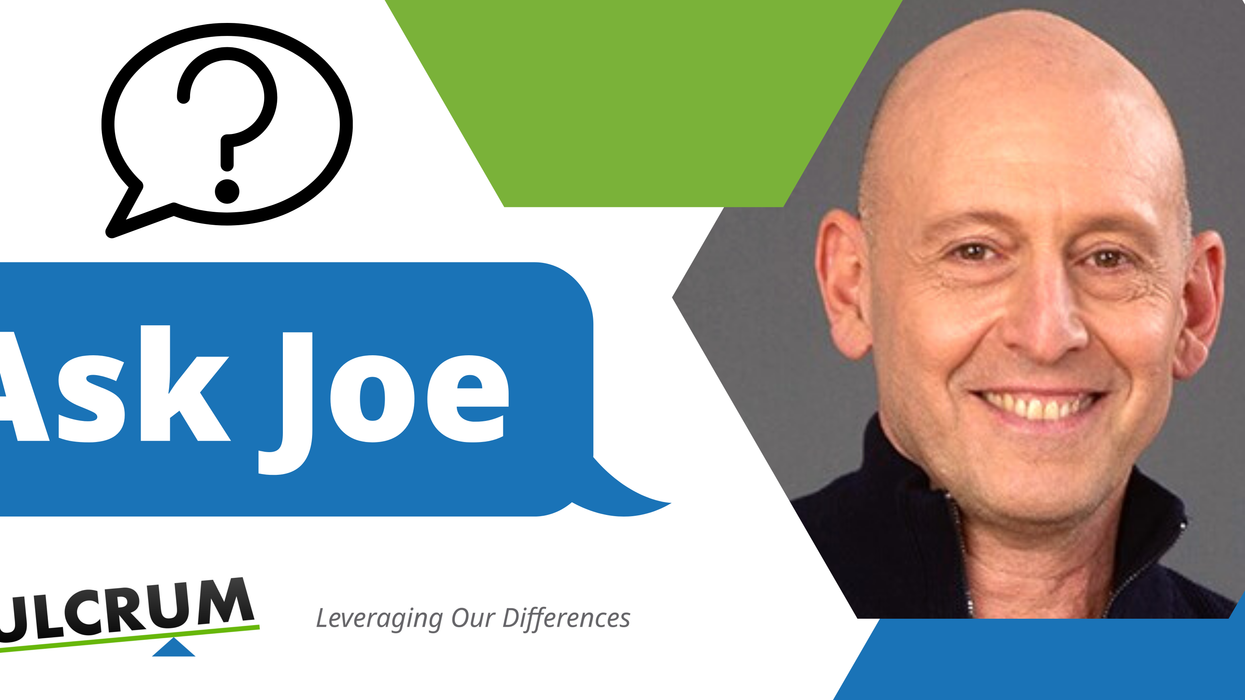Hi Joe,
What can we do to help ourselves override tendencies to react before thinking deeply about issues when involved in heated conversations? It has gotten so hard to have conversations at work. We try our best to not have conversations about politics and stuff at all. But not talking about it doesn’t make it any easier. I can feel the tension and it makes the day at work so tiring.
Thanks for your thoughts.
Reactive
Hello, Reactive
This is certainly a valuable question when we are all struggling with increases in anxiety and reactivity with one another. Since your question doesn’t focus on a specific issue, I can give some general tips.
Effectively navigating the uncomfortable tensions in challenging conversations requires staying aware of the various stressors along the way and, in every moment, assessing your level of discomfort and safety so you can shift appropriately. By doing so, you can move through challenges with skill, stay regulated and clear-headed, avoid falling into habitual patterns of aggression or being defensive, and, most importantly, maintain connection with your heart.
This doesn’t just happen naturally. It takes skill and practice to navigate these encounters with grace, softening hard-heartedness and establishing a real sense of safety for you and the other.
One thing to remember is that while these encounters may be uncomfortable, they are not inherently unsafe. The nervous system does its best to keep us safe by activating the fight-flight-freeze response. When the nervous system is in a regulated, balanced state, it will accurately assess the stressor and activate the appropriate response. A dysregulated nervous system, however, will make it more difficult to connect with what is happening at that moment; you end up judging and labeling the stressor (good/bad, right/wrong), placing an artificial veil around what you are perceiving, causing you to take distance from it. Because this transaction occurs in split seconds, you are not even aware it is happening. Even with people we consider friends, colleagues and family, we overlay unconscious beliefs, hurts or stories that obscure what is presently unfolding.
When you find yourself in a dysregulated fight-flight-freeze response, you are more likely to cause harm to yourself or others, perpetuating patterns of separation and opposition. You are no longer in alignment with your highest core values, nor connected with the compassion and wisdom in your heart.
On the other hand, when more regulated, you assess a situation or person based on facts, saying, for example, that “a bird is flying by,” as opposed to “what an ugly bird.” You can experience people and situations with a fresh openness, free from the imposed mental constructs that separate, demonize and set up opposition. When you assess without judgment, you allow people and situations to be who and what they are without pressure, expectation, judgment, criticism, manipulation or a need to defend. You are directly relating to the present moment without the reactive filters. This shift in perspective reawakens curiosity, compassion and possibilities of hope.
Interrupting the cycle of reactivity includes recognizing that, while the stressor may be real, it may not be as daunting, threatening or adversarial as your first reaction may have led you to believe. Any anxiety or trauma response, though justified, should be treated with love and compassion. However, reactivity based on the past makes it difficult to see a situation as it is right now.
This practice from my Fierce Civility program helps you regulate, letting go of judgment and labels, while bringing you back into your heart with a stronger connection to the present moment:
- Notice that you are in an agitated state of fight-flight-freeze.
- At this moment, feel your feet on the ground, then focus in your “core” – a spot in your lower belly that is your center of personal power, presence, awareness and deeper listening – and connect with your heart.
- Feeling your feet on the ground and focusing in your core and heart, take at least three deep breaths – in through your nose, out through your mouth.
- Determine whether you are safe – physically or emotionally. If not, then do what you need to do to take care of yourself. If yes, then recognize that you are in a state of discomfort, not unsafe.
- Do an investigation to identify what caused you to perceive the stressor in a way that activated agitation. It could be a judgment, past trauma, or lumping people and situations into labels, beliefs and polarizing groups.
- Replace the judgment with assessment, sparking curiosity and compassion.
- From this place, choose a new approach to the situation
This practice can have far-reaching benefits. By noticing how you respond to any stressful situation and then adjusting your words, thoughts and actions, you can build confidence and personal agency; external forces have less influence over the choices you make in life. You become sole creator of your story and your capacity increases to impact others in a beneficial way.
So, Reactive, I hope this helps and you find time to try this out. Trust that a little bit of practice every day can go a long way,
Joe
Ask Joe is dedicated to exploring the best ways to transform tensions and bridge divides. Our resident advice columnist and conflict resolution specialist, Joe Weston, is here to answer your questions in order to resolve tension, polarization, or conflict.
Learn more about Joe Weston and his work here. Make sure to c heck out Joe’s bestselling book Fierce Civility: Transforming our Global Culture from Polarization to Lasting Peace, published March 2023.
To Ask Joe, please submit questions to: AskJoe@Fulcrum.us.




















